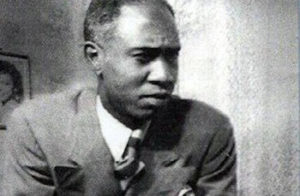
Melvin Tolson
Melvin Tolson was born on this date in 1898. He was a Black writer, educator, politician, and poet.
From Moberly, Missouri, Melvin Beaunorus Tolson was a contemporary of the Harlem Renaissance, and although he was not a participant, his work reflects its influences. In 1922, he married Ruth Southall, and two years later, Tolson graduated from Lincoln University with honors. In 1924, the same year, he and his wife moved to Marshall, Texas, where he taught Speech and English at Wiley College. While at Wiley, Tolson built up an award-winning debate team. In 1935, he led the Wiley Debate Team to the national championship to defeat the University of Southern California before an audience of eleven hundred people. He mentored students such as James L. Farmer, Jr. and Herman Sweatt at Wiley.
He encouraged his students to be well-rounded and to stand up for their rights. He took a leave of absence to earn a Master's degree from Columbia University from 1930 to 1931. Tolson began teaching at Langston University in Langston, Oklahoma, in 1947. Also, in 1947, Liberia declared him its poet laureate. Tolson entered local politics and would go on to serve three terms as Mayor of Langston, Oklahoma, from 1954 to 1960.
As a writer, from 1930 onwards, Tolson began creating poetry, and in 1941, Dark Symphony often considered his greatest work, was published in Atlantic Monthly. In 1944, Tolson published his first poetry collection, Rendezvous with America. The Washington Tribune hired Tolson to write a weekly column, Cabbage, and Caviar after he left his teaching position at Wiley in the late 1940s. 1965 Tolson's final work, the long poem Harlem Gallery, was published. The poem concentrates on African American life and is a drastic departure from his first works.
Tolson died after cancer surgery in Dallas, Texas, in 1966 and is buried in Guthrie, OK. The poems he wrote in New York, a mixture of various styles and free verse, were published posthumously in 1979 as A Gallery of Harlem Portraits. In 2008, part of his story was produced in The Great Debaters.